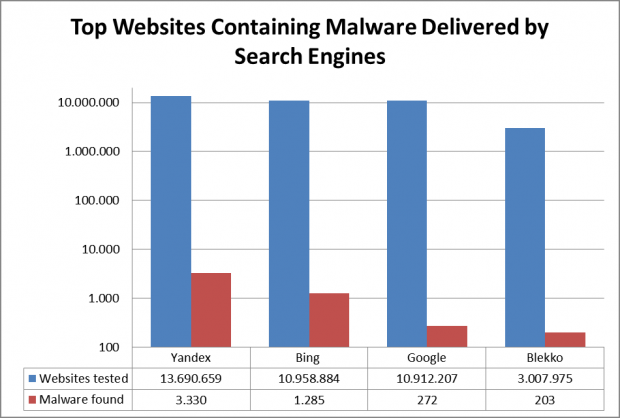Search engines like Google and Bing index the web. The web contains thousands (millions?) of malware links, either malicious websites or malicious downloads. So it shouldn’t surprise anyone that malware links can be found when searching via a search engine. The people at major search engines, including Google and Bing, realize this fact and put effort into filtering out malicious links. However, they aren’t always successful… but Google is more successful than Bing.
According to an eighteen month study, AV-Test Institute (who call themselves “the independent IT-security institute”, based in Germany) found Bing delivers roughly five times more malware search results than Google:
In total AV-Test Institute looked at that looked at over 40 million websites in search results from seven global search engines: Google, Bing, Yandex, Blekko, Faroo, Teomaand Baidu. As it turns out, Google and Bing actually have the two lowest rates of malware results. (Note: the above chart doesn’t show the results for all search engines tested.)
So, does that mean you should be worried about getting a malware link from Google or Bing? You should always be skeptical of clicking on links you don’t recognize, but you really don’t have to start pulling your hair out due to tension about being given malware links from Google or Bing. Why? Because if you do quick math, you will learn, according to this study, the rate of malware websites delivered by Google is .0025% and for Bing is .00117%. With such low rates, the chance of you personally being served a malware link in search results by Google or Bing is beyond minimal.
That being said, as AV-Test Institute points out, Google serves billions of search results every day. So, even with such small rates, that means thousands of people are receiving malware links in search results every day:
The relationship between the websites examined and the malware found seems harmless at first glance.If we factor in thef act that Google processes around 2 to 3 billion search requests every day, however, it becomes clear that hundreds of thousands of infected websites are delivered to users on a daily basis.
So, yeah. Don’t get rid of that anti-virus/anti-malware program just yet.
[via AV-Test Institute]

 Email article
Email article





